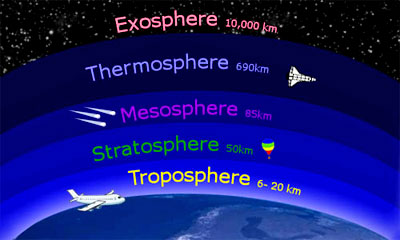I am wondering if altitude is the only thing you need to know in order to evaluate the "thinness of air" at certain point on Earth. For instance, will climbing a 6000 m peak in the Andes or a 6000 m peak in the Himalayas make any difference in how you need to acclimatize to the elevation? (I'm not referring to how tough the climb is.)
-
1You mean the oxygen concentration and not the density I guess. Temperature is the most important point that comes to my mind. If you are asking concerning to the influence on the human body: as far as I know it's not the oxygen concentration in the air, it's about the partial pressure, that lowers the body's ability to absorb oxygen.– WillsCommented Sep 11, 2014 at 20:19
-
Right! So is the altitude the only thing that matters when estimating the partial pressure ?– VanillaSpinIceCommented Sep 11, 2014 at 20:44
1 Answer
I'm guessing by "thinness" you mean the ability to breath air. Couple of things to note here:
- Your ability to breath decreases as your altitude increases because of a lack of Oxygen.
- the relative amount of Oxygen in the air is static (there is almost exactly the same percentage of oxygen 23% at 10,000 feet as 1 foot).
- What does decrease at altitude is the air pressure (there is less oxygen but there is less of all air gasses)
I am wondering if altitude is the only thing you need to know in order to evaluate the "thinness of air"
Yes and No....
At low altitudes above the sea level, the pressure decreases by about 1.2 kPa for every 100 meters. For higher altitudes within the troposphere, the following equation (the barometric formula) relates atmospheric pressure p to altitude h

From Wikipedia
Where:
p0 sea level standard atmospheric pressure 101325 Pa
L temperature lapse rate, = g/cp for dry air 0.0065 K/m
cp constant pressure specific heat ~ 1007 J/(kg•K)
T0 sea level standard temperature 288.15 K
g Earth-surface gravitational acceleration 9.80665 m/s2
M molar mass of dry air 0.0289644 kg/mol
R universal gas constant 8.31447 J/(mol•K)
You may be in the troposphere depending on the height:

Weather also alters air pressure, the high and low symbols on your weather chart. High pressure means their is more air currently and low means less. Though these are very small variations in the scheme of things.
At the altitudes that people climb at pretty much the only thing that is important is altitude!
When it comes to climbing mountains, Oxygen pressure is only one factor.
Sometimes a much more important factor is the persons ability to efficiently process as much of the available Oxygen as possible. This is why (for example) sherpa's perform much better at high altitude than someone from Wales. Being born at high altitude (and possibly their genetics from thousands of years of living at altitude) they have more red blood cells and their bodies are much better at processing the available Oxygen.
-
Great answer. That pretty much answers my interrogations. Commented Sep 12, 2014 at 18:00
-
2